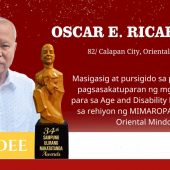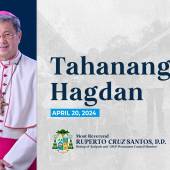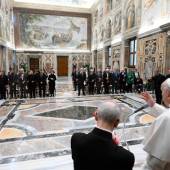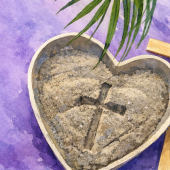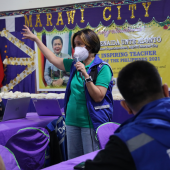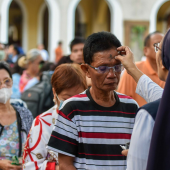Disability Commission Official says God never creates a failed product
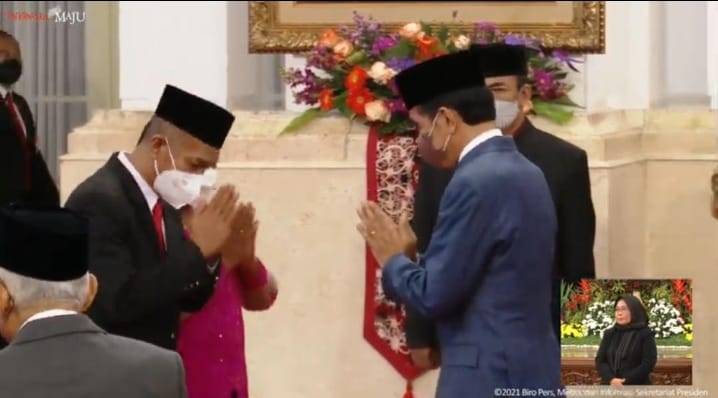
Indonesian Catholic Ignatius P. Kikin Tarigan describes his journey, efforts to deal with physical disabilities and looks forward that the Catholic church will play a vital role in changing the perception about persons with disabilities.
Indonesian President Joko Widodo recently appointed a new National Disability Commission to pay special attention to the exceptional people in the country.
Among the seven members, two are Christians, including Ignatius P. Kikin Tarigan, a Catholic.
"This commission was born as a result of the international conference on persons with exceptionalities," explained Tarigan, a parishioner of St. Yosef parish of Southeast Aceh, Aceh Province.
"Indonesia then designed a law for exceptional people, one of which was the establishment of this commission," he continued.
Through a very tight selection and quite a long journey, finally, Tarigan and his six colleagues were appointed as members of the National Disability Commission by the president on December 1, 2021. Four members of the commission are exceptional.
"So, with the seven members, the commission is well represented. I am grateful to be included in this commission," assured Tarigan. "The position of this commission is for five years."
Tarigan, who is in his 50s, has three children—two are currently studying college in Yogyakarta, and the youngest is a junior high school student and lives with his mother in Aceh. Meanwhile, due to work assignments, Tarigan lives in Jakarta.
Before his new appointment, he served as chairperson of the Indonesian Catholic Student Association (PMKRI), general secretary of the Catholic Scholars Association, and was a lay apostolic member of the Indonesian Catholic Bishops' Conference (KWI) for two terms. He has also been actively involved in the Indonesian Catholic Youth.
Master of Management graduated from the Bogor Agricultural Institute, Tarigan received his bachelor's degree from the Super Semar University major in inland science. During his childhood, he was bullied and rejected by his schoolmates.
"I was born with a malformation of the palate," he told RVA News. "I am a former disabled person, who could not speak like normal children at my age," he recalled.
Tarigan underwent palate malformation surgery at five. For two years after his surgery, he had speech therapy. At seven, he could speak and attended public schools.
"Because of my speech retardation, I experienced a lot of bullying, being excluded, being called 'the mute' and 'the dumb' and the like," he narrated.
He feels different from others and is afraid and not understood by his peers because his words are not assumed by others.
Furthermore, Tarigan stated, "My only friend when I was young was just a dog, apart from my mother and sister who understood what I was saying."
This experience left a deep mark on his life and he does not want this experience repeated by others.
Unfortunately, his youngest child had the same condition—a malformation of the palate. Because of Tarigan's experience, his son received medical treatment promptly. At five, the son had completed surgery and speech therapy. Currently, the child speaks normally and attends regular schools.
Although there are still fears in Tarigan, whether his descendants and grandchildren will experience the same thing as him, Tarigan surrenders everything into God's hand.
His life experience makes Tarigan feel that he is one of the exceptionalities through different types.
"Not all disabled colleagues can get the opportunity like me, who can speak normally after previously struggling with my inability to speak," he continued.
"Why am I interested in the field of exceptional people? Because being disabled is a part of my life, part of the experience of who I am right now," he asserts.
Feeling called to be part of the disability commission, Tarigan believes in God. It is a divine plan that he is appointed to honor, protect and fulfill the rights of those with exceptionalities.
"I have to prove this calling as a process of faith. I was born disabled and have been involved in several Catholic organizations which finally brought my journey to this place," he added.
Meanwhile, the toughest challenges he has in his experience being and working with exceptional people are changing the community's mindset and perspective about people with disabilities.
"Currently, there are around 24 million people with various types of exceptionalities in Indonesia among 270 million populations. Many Indonesians do not understand disability, moreover to care about them," he described.
According to him, people are born from a society where civilization about disability has existed since ancient times, even before Jesus existed and long before the prophet Isaiah.
"When Jesus opened the Torah in the temple and read the book of Isaiah: The spirit of the Lord is upon me because he has anointed me to bring good news to the poor. He has sent me to proclaim release to the captives and recovery of sight to the blind, to let the oppressed go free (Luke 4:18). I believe that people with exceptionalities have existed since ancient times," he explained.
Tarigan emphasized that the stigma about the disabled had existed since the time of Jesus, where people would blame parents for the paralysis or blindness of their children. "So this stigma has also been around for a long time, and surprisingly it has not disappeared until now."
This stigma has become a part of civilization and it is difficult to get rid of; however, it is possible in the Catholic Church to change it.
"Catholics must undergo a matrimonial preparatory course before marriage," he said. "This moment can be used as the beginning to break the stigma by providing a paradigm about people with exceptionalities to participants."
He hopes that the Catholic Church will include material on disability/teaching about disabilities from the start, especially in marriage preparation courses.
"This is important in the future. Are they ready to accept children with disabilities? Are they also ready to teach their children who are not disabled about the disabled with the concept of children, with the child's way of thinking?" Tarigan asked.
He believes that if children at an early age are given a right understanding of exceptionalities, and the diversity of human beings such as ethnicity, skin color, and hair type, then people with disabilities can live normally as for those with exceptional in society.
"Because essentially God never creates a failed product, so do the disabled," clarified Tarigan.
"There are such types, God's creations are different, some are with hearing impairment, some are with speech and sight impairments, so when the children meet them, they do not feel anything strange and there is no bullying again," he further explained.
Tarigan also believes that the story at the time of Jesus 2000 years ago when He performed miracles is still valid today, where miracles can still happen.
"When people with physical disabilities can be provided with accessible walking facilities, when blind people are allowed to learn Braille, technology allows us now to perform miracles so that people who are blind can see. Paralyzed people can still take their steps, and the deaf can hear. We have to build this concept, that miracles at the time of Jesus still existed," said Tarigan.
Having been educated about Scripture by one of the Jesuit priests for three months when he was in PMKRI, Tarigan was inspired by Luke 4:18 in carrying out his activities and services.
As for now, the main program of the National Disability Commission is to organize, collect data, monitor, project plans, and evaluations, but the most important thing is to ensure the fulfillment of the rights for persons with disability throughout Indonesia, the world's Muslim-majority country.
"Disability is not only a problem for activists or people with disabilities or organizations that are for/with them, but also a problem for us and is our concern," he explained.
The commission will conduct social awareness on disability through religious leaders, youth, students, and political parties to achieve this.
To date, there are many those with disabilities who experience sexual harassment in society, are treated unfairly, excluded, and bullied by those who do not understand them properly.
"I have high hopes that the Catholic Church will do many things, such as how marriage preparation courses can be used as an effective medium to break the stigmatized chain while also providing the right understanding about exceptional people. Therefore, the Catholic community can truly be an example in society," he said.
He further explained that the church can also include the disabled as one of their pastoral focuses.
"Like in the diocese of Surabaya in East Java, they have a pastoral plan for the disabled, to support and assist the catechesis for the disabled before receiving some sacraments," said Tarigan. "That way, their faith can be accounted for."
It would be very unfortunate if the stories in the Bible were only read every year but there were no changes and no concrete steps for the disabled in the church, he added.
"So, once again I hope that people with disabilities are included in the pastoral plan of the church like other commissions. If there is a "Laudato Si" for the environment, hopefully, there will be a social encyclical on disability and the elderly," emphasis Tarigan before ending the sharing.
Radio Veritas Asia (RVA), a media platform of the Catholic Church, aims to share Christ. RVA started in 1969 as a continental Catholic radio station to serve Asian countries in their respective local language, thus earning the tag “the Voice of Asian Christianity.” Responding to the emerging context, RVA embraced media platforms to connect with the global Asian audience via its 21 language websites and various social media platforms.









